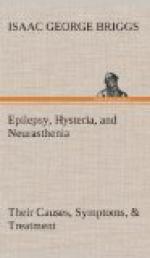The victim of these attacks is suffering from a disease, for she shows many temporary mental symptoms which could not possibly be feigned, while there is often a genuine partial forgetfulness of the incidents of an attack. She says she cannot help it; candid friends say she will not. The truth is that she cannot will not to help it; for though intelligence and memory are often good and sometimes abnormal, the judgment and will are always weak—indecision, obstinacy, and doubt being common.
Treatment. A thorough examination by a doctor is absolutely essential, to prove that the patient is merely hysterical, and not the victim of unrecognized organic disease. In a few cases, skilled attention to some minor ailment will result in an apparently miraculous cure.
Many who habitually “go into hysterics”, are merely grown-up “spoiled children”, and in all cases, the basic factor is a lack of control and self-discipline.
Unfortunately, these tainted individuals who are so exquisitely sensitive that any reproof brings floods of tears, turn with mercurial rapidity from passionate fury to passionate self-reproach, and assuage by impassioned protestations of affection the distress they have carelessly inflicted, and, as a consequence of their momentary but undoubtedly sincere contrition, escape blame and punishment.
Harmful sympathy is thus substituted for helpful discipline, and the more stable members of the family are often made slaves to the whims and caprices of the hysterical member.
The usual home treatment of the victim passes through various stages, and lacks persistence. Violent methods are succeeded by studied indifference; and that again by reproaches and recriminations.
Greene’s remarks are very pertinent: “The condition must be regarded as an acquired psycho-neurosis to be ameliorated, and perhaps removed, by suggestion and a complete control, which, though kind, is firm, persistent, insistent, and lacking in every element that enters into the upbuilding of the hysterical temperament.”
For anaemic patients, the following is a useful prescription:
R.
Quininae valerianatis gr. xx
Ferri valerianatis gr. xx
Ammon. valerianatis gr. xx
Misce et fiant pilulae no. xx
Sig.: One or two three times a day,
after meals.
As far as the minor symptoms are concerned, the disease is usually chronic, for as soon as one symptom has been overcome another takes its place, and there is little hope of cure save when the case is taken vigorously in hand in childhood, treatment being best given in a home or hospital. Home treatment consists in an attempt to inculcate the lost or never-acquired habit of self-control, and in the hygienic measures laid down for neuropaths in general in the rest of this book.




